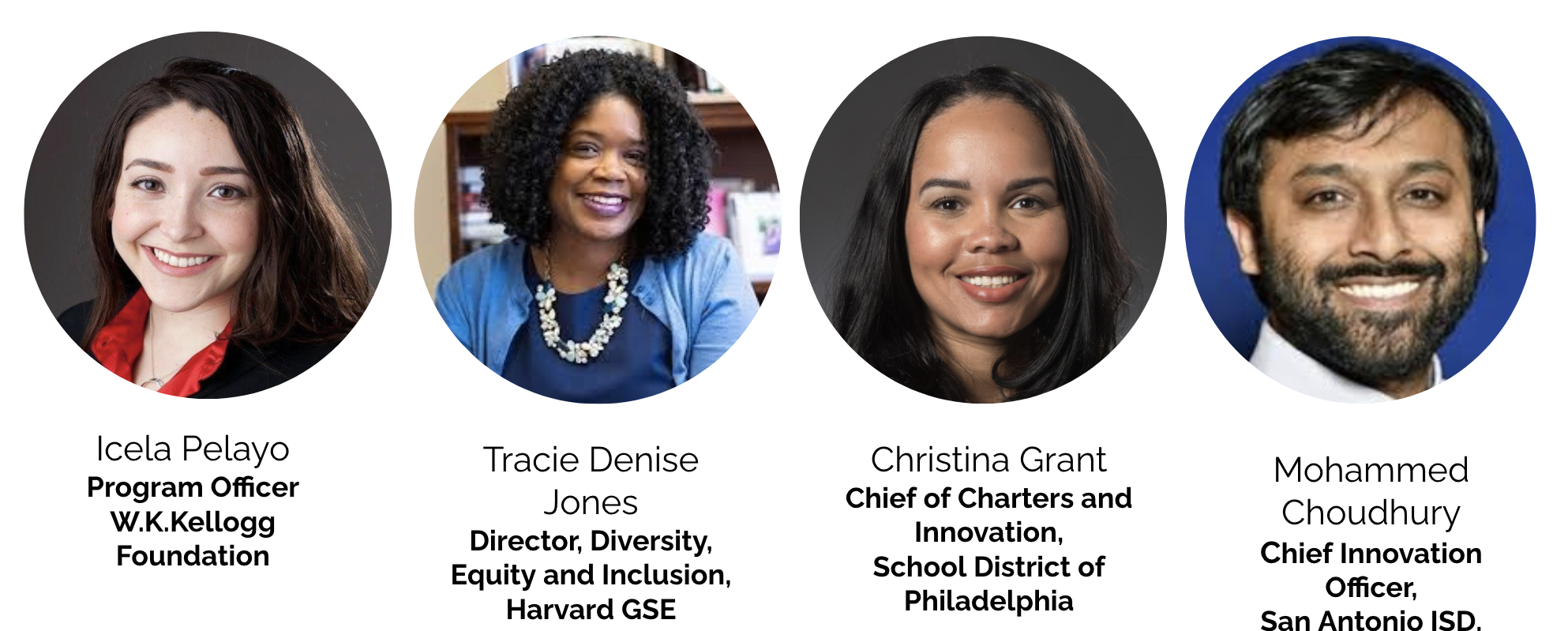
COVID-19 and the contemporaneous incidence of racial violence across the United States has highlighted the multiple inequalities deeply rooted in our education system. So what does equity look like in this new world and what are the solutions needed to bring it to the forefront of how we work, educate, and advance society?
On May 28th, Catalyst:Ed hosted a conversation with some of education’s most thoughtful leaders to discuss the issues and solutions that lay ahead for public education, policy, and philanthropy in the wake of COVID-19. The speakers included Christina Marie Grant, Deputy Superintendent, The School District of Philadelphia; Icela Pelayo, Program Officer, W.K. Kellogg Foundation; Mohammed Choudhury, Chief Innovation Officer, San Antonio ISD; Tracie Jones, Director, Diversity, Equity and Inclusion, Harvard GSE; and was moderated by Tre Johnson, DEI Partner, Catalyst:Ed.
The Equity in Crisis conversation ultimately conveyed that the pandemic has been just as much about oppression as it has been about opportunity. Listening to some of the public sector’s most committed leaders revealed familiar reflections about the pandemic: it didn’t create inequalities so much as it laid them bare, that there’s been an often arbitrary sense of what is and isn’t possible, and the importance of literal and figurative connection.
Over the course of an hour, we discussed how those ever-present inequalities made themselves known in these recent months. From the perspective of a district leader, there was talk about the inability to address pre-existing trauma and challenges that existed in the communities that they serve–from staff to students. Many people are being walloped by the strength and persistence of the pandemic’s impact. In particular, Choudhury and Grant discussed the ways in which systems have historically labored to meet the needs of the people; from school zoning rules to access to resources, so much has already been in place to stymie equal progress in the country. “There isn’t a normal we should be getting back to”, Choudhury stated at one point. And Grant agreed, offering that her district’s abilities to pivot nimbly during a crisis was a reminder of how arbitrary it was to hold onto the ‘status quo’ that ruled the day pre-COVID-19. “We’re real good in a crisis”, she said, and saw that both as proof of the district’s ability to care and contextualize support, but also how it asserts the bar on what we need to believe is possible.
The panelists also each discussed the importance of cultural and interpersonal connections. Pelayo talked about how so much of the current time is about naming racism as “a structural issue” and that because of that, we need to value investing people on America’s sustained history around structural oppression and racism. Jones also agreed to the notion of racial progress, healing, and reflection, asking people to “do their work” when it comes to educating themselves on America’s history, from “lynching, discrimination and (America’s) historical roots.”
Comprehensive connection also served as an undercurrent of the discussion, with everyone opining that this has been a call to action to establish the types of connections that value, repair, and support people’s humanity during these times. Whether as a teacher, school leader, student or philanthropist, there was the recognition that for everyone–but in particular people who are marginalized due to their identity, community or background– some real attention to care and mental health has become vital to sustainability and progress.
And with that connectivity came also a policy-type call to action; everyone on the panel agreed that internet access, not in place of but in addition to resources like laptops and Chromebooks, needed to be treated as a public utility. So much of the fractured, deepening inequality is threatening to fester because in addition to the cultural divide, we have a digital divide, too. The group suggested that part of the chaos we need to tamp down could be partially resolved if everyone in the country had equitable access to the internet; an issue that is handicapping a lot of the neediest households that are threatened to be left behind while the rest of the world tries to strategize how to move forward.
The participants acknowledged that schools are constantly growing, changing, and evolving, and, in many ways, this present moment is a continuation of this legacy. They identified the opportunity that this present moment offers to foster more equitable educational systems; however, they cautioned against rapid solutioning that ignores the historical complexities that have contributed to gaps in opportunity and experience. Each participant issued a call to action:
-
- Do your work
- Step up with time, talent, and treasures
- Make internet access a public good
- Consider how to create interconnected systems of support that fosters the whole child
We appreciate our panelists for their time and their thoughtful contributions to this ongoing conversation. You can access the recording of the conversation here!
